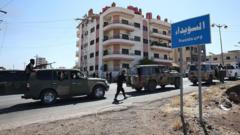Trump’s decision may have averted a larger conflict, signaling a possible path to peace.
**Ceasefire in Sight: Trump's Gamble with Iran Pays Off - For Now**

**Ceasefire in Sight: Trump's Gamble with Iran Pays Off - For Now**
As the U.S. president navigates the volatile waters of Middle Eastern conflict, a potential ceasefire between Iran and Israel emerges following U.S. intervention.
In a surprising turn of events that could reshape the geopolitical landscape, U.S. President Donald Trump announced a noteworthy agreement between Israel and Iran, suggesting a ceasefire that may lead to enduring peace. On Tuesday evening, he referred to the recent tensions as the "12 Day War," which many believed was escalating dangerously close to a broader regional conflict. This announcement comes in the wake of U.S. airstrikes that targeted Iranian nuclear facilities over the weekend.
Iran’s Foreign Minister, Abbas Araghchi, indicated that the ceasefire could hold if Israel ceases its military actions by 4 AM Tehran time. Attacks from Israel reportedly came to a halt as the deadline approached, potentially paving the way for reduced hostilities between the two nations.
This escalation had occurred after Iran executed its promised retaliation for the recent strikes. Reports indicate that Iranian missiles aimed at an American base in Qatar were successfully intercepted with no resulting casualties, signaling a cautious approach from both sides. During his address on Saturday, Trump warned of severe consequences should Iran target U.S. interests, but so far, the situation reflects a more tempered response.
Iran’s missile attack, which matched the number of bombs dropped on them during the U.S. strikes, hints at a strategy focused on maintaining proportionality rather than escalating the conflict further. In the aftermath, Trump labeled Iran's counterstrike as weak and expressed optimism that this exchange might facilitate a return to dialogue and peace.
While the U.S. President has signaled a readiness to engage in further discussions with Qatar's mediators and Israeli officials, he is also keenly aware of domestic and international scrutiny. Past precedents, such as the U.S. response following the assassination of Iranian General Qasem Soleimani, emphasize the delicate balance Trump now seeks to achieve.
He insists that the current situation is not irreparable and appears interested in avoiding further military escalation, as long as Iran refrains from additional aggressive actions. However, any further provocations from Tehran that result in American casualties could shift the narrative entirely, forcing Trump’s hand in response.
Presently, both nations appear to be assessing their next moves with an eye toward diplomacy. While tensions remain high, the potential for a ceasefire offers a flicker of hope for a more peaceful resolution in this historically fraught region. With the involvement of outside nations and continued dialogue, the groundwork is being laid for a potential de-escalation of hostilities with hopes for the return of stability in the Middle East.
Iran’s Foreign Minister, Abbas Araghchi, indicated that the ceasefire could hold if Israel ceases its military actions by 4 AM Tehran time. Attacks from Israel reportedly came to a halt as the deadline approached, potentially paving the way for reduced hostilities between the two nations.
This escalation had occurred after Iran executed its promised retaliation for the recent strikes. Reports indicate that Iranian missiles aimed at an American base in Qatar were successfully intercepted with no resulting casualties, signaling a cautious approach from both sides. During his address on Saturday, Trump warned of severe consequences should Iran target U.S. interests, but so far, the situation reflects a more tempered response.
Iran’s missile attack, which matched the number of bombs dropped on them during the U.S. strikes, hints at a strategy focused on maintaining proportionality rather than escalating the conflict further. In the aftermath, Trump labeled Iran's counterstrike as weak and expressed optimism that this exchange might facilitate a return to dialogue and peace.
While the U.S. President has signaled a readiness to engage in further discussions with Qatar's mediators and Israeli officials, he is also keenly aware of domestic and international scrutiny. Past precedents, such as the U.S. response following the assassination of Iranian General Qasem Soleimani, emphasize the delicate balance Trump now seeks to achieve.
He insists that the current situation is not irreparable and appears interested in avoiding further military escalation, as long as Iran refrains from additional aggressive actions. However, any further provocations from Tehran that result in American casualties could shift the narrative entirely, forcing Trump’s hand in response.
Presently, both nations appear to be assessing their next moves with an eye toward diplomacy. While tensions remain high, the potential for a ceasefire offers a flicker of hope for a more peaceful resolution in this historically fraught region. With the involvement of outside nations and continued dialogue, the groundwork is being laid for a potential de-escalation of hostilities with hopes for the return of stability in the Middle East.





















